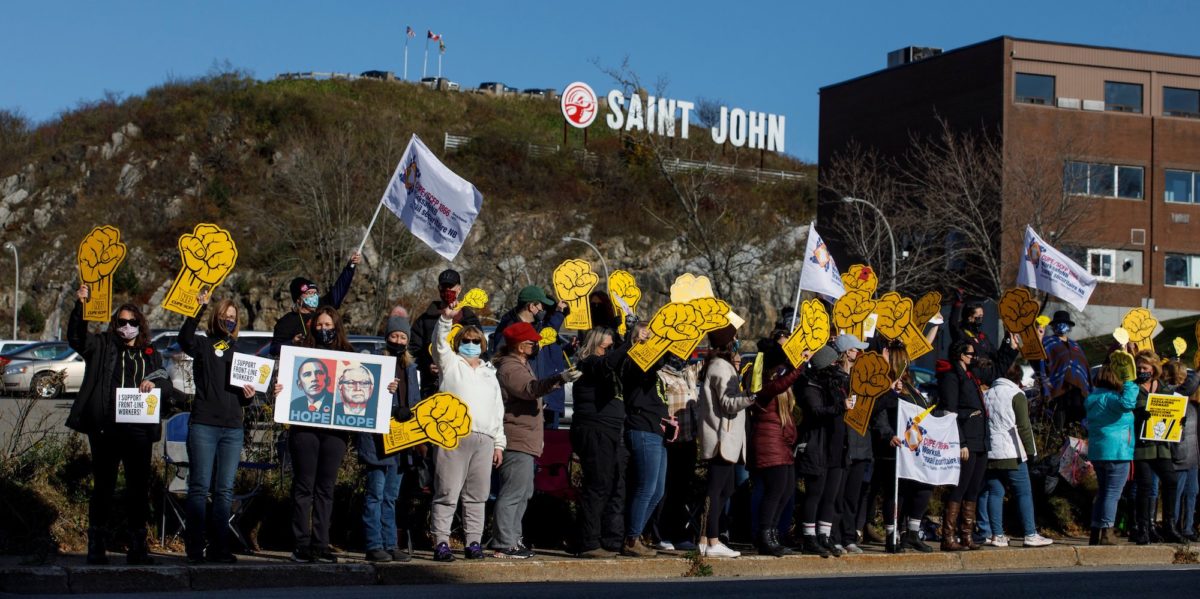New Brunswick’s largest union is experiencing confusion and frustration on the picket line, as many workers have been mandated back-to-work.
The on-again, off-again negotiations reached a boiling point on Friday after health and laundry workers found out their striking action would soon become illegal.
The mandate comes after a text message from the premier to the union’s president last week encouraging both sides to return to the bargaining table — days after the government walked away from negotiations.
The Office of the Premier declined rabble.ca’s request for comment, redirecting this reporter to Higgs’ Friday press conference when health workers were ordered off the picket line.
A Saturday press release from the provincial government read:
“The CUPE strike had a significant impact on the health sector including cancellation of appointments and surgeries, delays in testing and laboratory processing as well as on cleaning and food services. It is anticipated it will take several days before New Brunswickers see a return to normal operations within hospitals.”
The Canadian Union of Public Employees (CUPE) in New Brunswick began striking on Oct. 29. The largest union in the province, CUPE represents roughly 28,000 workers in health care, education, transportation, and social services.
CUPE NB President Stephen Drost said that as a result of the text message, union and government representatives met with a mediator Thursday afternoon. The meeting, which lasted eight hours, was outside of the central bargaining team and therefore was nonbinding.
Drost told rabble.ca in an interview ahead of Thursday’s meeting that he’s hopeful negotiations can get back on track.
“We’re cautiously optimistic,” he said, adding, “We’ll give him the benefit of the doubt and we’re hoping that he is sincere.”
The details of the meeting remain unclear, as both sides agreed to a media blackout while efforts to get back to the bargaining table resume.
Drost added that in the meantime, adding that picket lines are “full steam ahead.”
The text from Higgs represented a shift in strategy from the provincial government, who walked out of collective bargaining negotiations with the province’s largest union only a week ago.
Strike came after 100-day notice
In a sign that the upperhand in the workforce could be shifting for the first time in decades, thousands of New Brunswick workers took to the picket lines at MLA offices and the provincial legislature beginning Oct. 29.
The picket lines are described by Drost as a last resort, noting the union gave a 100 day notice of potential strike action.
Not only that, but as the province’s worst outbreak of COVID-19 tore through New Brunswick during the month of September, CUPE NB held off on strike efforts for an additional two weeks.
CUPE says its members in New Brunswick are the lowest-paid public service workers in Canada. To make matters worse, stagnant wages have resulted in inflation rates rising above wage increases, representing a net loss for workers over the last decade.
That’s why the union, despite its willingness to drop entry-level wages by eight per cent, isn’t budging on wage increases for existing employees.
“Let’s resolve this labour unrest, let’s achieve some labour peace, and let’s get these workers back [to] their jobs with decent wage increases,” Drost said.
Simon Ouellette, communications advisor for CUPE NB, tells rabble.ca Higgs’ move to bypass the centralized bargaining team to text Drost is “a little piece of a long story of disrespect [from] this government.”
Ouellette, who calls himself both cautiously optimistic and cynical ahead of the prospective renewed negotiation, describes the situation as reaching “a boiling point.”
The blame, according to Ouellette, is squarely on Higgs, who came back to the bargaining table with a second offer even worse than the first.
“We’re not bargaining backwards,” Ouellette said. “At the end of the day here, we’re going to have to come to a deal and maintain public services because the population needs [them].”
How did we get here?
The move was two months in the making, after centralized bargaining on wages broke down between the union and the provincial government in late August.
Within a week, CUPE issued a press release accusing the government of walking away from the negotiation table. The government “wouldn’t budge”, the union said, from their latest wage increase offer, “1.25 per cent per year for forty years … represent[ing] less than $0.27 per hour for CUPE members’ median wages.”
That median 27 cents also came at a cost. CUPE says the agreement was “conditional on the union accepting a laundry list of rollbacks of benefits from our collective agreements.”
By the end of September, CUPE members began voting to authorize walkouts, accusing premier Higgs of stalling negotiations.
On Oct. 27, CUPE announced that the provincial government walked away from negotiations for the second time. After three days of bargaining, the mediator advised CUPE the government would not respond to their “last pass.”
In a press conference later that day, Higgs boasted an expected provincial surplus for a second consecutive year, after touting a $408 million surplus in 2020.
In the same speech, Higgs claimed that CUPE was responsible for the negotiation breakdowns.
CUPE says that simply isn’t true.
“At approximately 10:15 pm, October 26, 2021, the mediator informed the union that the ‘rug had been pulled from under their feet’ when the employer’s bargaining team and the employer had no further offers.
The strike in New Brunswick isn’t an outlier either. The pandemic has highlighted miserable working conditions in low-paying jobs in retail and the food industry. Yes, the same “heroes” whose pandemic bonuses were clawed back within six months. In the United States, at least 270 strikes have taken place in 2021 as of November 1, according to the Labor Action Tracker at Cornell University’s ILR Labor School.



